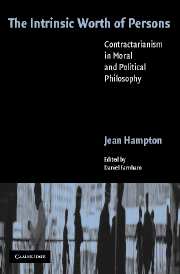Book contents
6 - The Contractarian Explanation of the State
Published online by Cambridge University Press: 14 January 2010
Summary
How do governments originate? How are they maintained? These are two causal questions about how states originate and persist through time that have always been of interest to anthropologists and historians. To answer them, however, one also needs to know the answer to a conceptual question “What is a state?” This chapter attempts to answer all three questions by using ideas drawn from the social contract tradition. Together the answers constitute what I will call an explanation of the state.
It may seem fantastic to some that the social contract argument could provide plausible answers to the two causal questions. Doesn't the contract argument make the state's creation and maintenance the result of each subject's contractual consent to it? And isn't this a wildly inaccurate explanation of virtually every state's origin and continued existence? As Hume wryly observes:
[W]ere you to ask the far greatest part of the nation, whether they had ever consented to the authority of their rulers, or promis'd to obey them, they wou'd be inclin'd to think very strangely of you, and wou'd certainly reply, that the affair depended not on their consent but that they were born to such obedience.
In response to such ridicule, supporters of the contractarian methodology have tended to back away from claiming that their contract talk has any explanatory import.
- Type
- Chapter
- Information
- The Intrinsic Worth of PersonsContractarianism in Moral and Political Philosophy, pp. 185 - 218Publisher: Cambridge University PressPrint publication year: 2006



